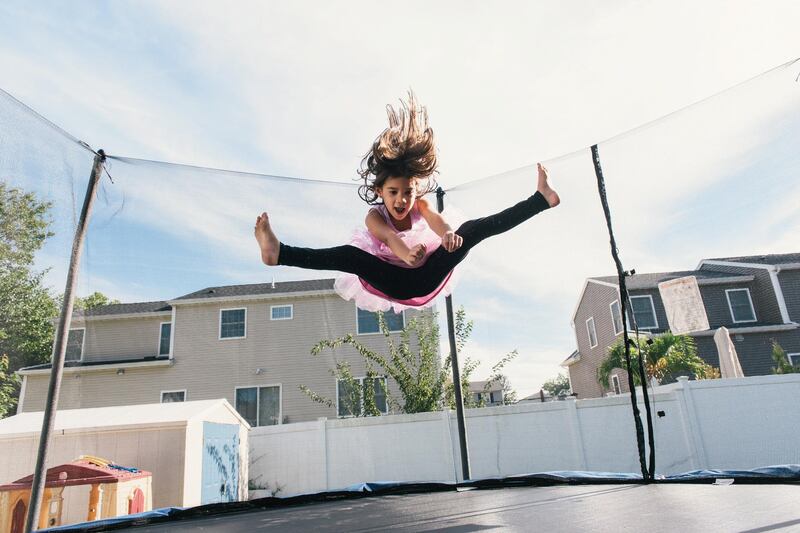My kids love nothing more than whiling away a Saturday morning at the trampoline park. My eldest daughter approaches her bouncing in the same way as she tackles the rest of her life – with thoughtful care. Meanwhile, her younger sibling throws herself in, doing somersaults and performing tricks without a moment’s thought for safe landings. It’s a gung-ho approach that has little to do with padded springs and non-slip socks. That’s just how she rocks.
But which one do you think displays more emotional resilience? The answer is the big sister, who’s had more to overcome in the shape of dyslexia and anxiety. She can dig deep and have a more positive outlook in the face of adversity than the gymnast, whose response is often to run and hide. This difference neatly illustrates scientific research showing that resilience (the capacity to recover from a crisis and return to the status quo) can be learnt. Now, how to even the odds and make both equally capable of coping with life’s many ups and downs?
Bring on a trusted friend
The stress of being different to her classmates when it came to learning to read turned my eldest daughter into an extremely angry 5-year-old who didn’t want to go to school. Short weekly sessions with a school counsellor to discuss these scary feelings helped her to turn down the rage, and as she made academic progress, her outlook was transformed. Ever since, she has used good teachers like trusted friends to reinforce her progress and sense of self. According to Harvard University’s Centre on the Developing Child, fostering these kinds of supportive relationships, at home and in the wider community, is a crucial buffer in protecting children and helping them to turn “toxic stress”, which disrupts healthy childhood development, into “tolerable stress” and greater resilience.
No problem too small
Support doesn’t have to mean intervention by a professional, in the same way that a problem doesn’t need to be huge to require a solution. Noticing when your child is troubled and talking through smaller, manageable problems, gives him or her practice at resolving issues. This is an important skill to build for the inevitable challenges ahead.
But why?
Anger, tears and meltdowns are common reactions to childhood setbacks, but unhelpful tools for problem-solving. It takes a great deal of persuasion, but sometimes, just sometimes, I manage to coax my youngest daughter into a few, focused deep breaths, so we can talk about what's troubling her. Giving children the means to separate overwhelming feelings from their cause helps them to feel that a problem is manageable. Feeling in control is one key to resilience.
Great job (or not)
You’ve identified and helped to work through something that was troubling your child. Now don’t forget to finish the forensic examination of events with a heartfelt: “Well done, you handled that really well.” That way, you are building up confidence for next time around.
Knowing when to step in or step back
When parents step in to "rescue a child from a problem she can handle on her own, we short-circuit her opportunity to learn how to address a difficult issue or understand her capacity to handle hard stuff", according to Dr Daniel Siegel and Dr Tina Payne Bryson, authors of The Yes Brain Child: Help Your Child Be More Resilient, Independent and Creative. But that's not to say we should leave kids to cope before they are ready, Siegel and Payne Bryson write. "When they face a challenge that's too big to handle alone, we fiercely support them. Whereas at times we push, asking them to do more than they are comfortable with, at times like these, we provide the cushion, letting them know that we're on their side, that we've got their back."
Now you do it
The need for parents to take a long, hard look at their behaviour should come as no surprise to regular readers. How often do you react to a problem in anger rather than with logic and problem-solving rationale? How successful are your own coping methods and could they be improved, Siegel and Payne Bryson ask. Kids are still developing soft skills such as decision-making and empathy because the prefrontal cortex, the front section of the brain that processes emotional and social intelligence, is not hardwired; this circuitry evolves based on our unique experiences over a lifetime. The common-sense thesis is that parents are better equipped to help their offspring develop robust emotional and relational skills if their own neurons are firing in that direction. So take a note of what flips your switch, replacing reason with more basic instincts like anger, and what works to keep you calm: "Knowing your particular strategy is a source of resilience." And no one needs resilience more than an active parent.
_______________________
Read more:
How to speak to kids about mindfulness
How to speak to kids about exercise
How to talk to kids about money
How to talk to kids about healthy eating
_______________________





